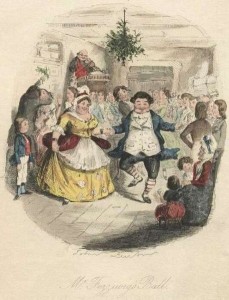
Carolers Were Random Actors of Old
It has been a very long time since any Christmas carolers came to my door, and even longer since I went myself, as a youngster.
But I remember distinctly walking the frozen streets of our northern Illinois hometown, singing along with a group of people I think were from church or high school, or a combination of both. At its best, the music wasn’t that bad, and you were singing to a house full of appreciative people who had some cider or something like it at the ready to warm the bodies and throats of these strangers who were celebrating the season in musical fashion.
In a way, those long-ago caroling nights were repeated random acts of culture, if you think about it. They took a lot of organization and they came almost always as a total surprise to our listeners, and that somehow made things more joyful.
My old Grove dictionary (the 1980 edition) has a good piece about the history of carols and caroling, and it appears much of the modern tradition has its roots in 18th-century England, though the establishment of a separate body of carols goes back to the Middle Ages, and these songs were either about Christmas or the Virgin Mary. The article cites an 1823 book that tells us the tradition in Wales had been to sing carols to the accompaniment of a harp during the midnight services:
“Whilst the Christmas holidays continue, they are sung in like manner in the houses, and there are carols especially adapted to be sung at the door of the houses by visitors before they enter,” says the citation from Grove. That pretty much describes what caroling is like today, though one gets the sense that there is a public aspect to that long-ago practice that has almost disappeared for us.
The shift of the global economy to the computer as the chief negotiator of commerce, which in turn has substantially altered the way people relate to each other, has hurt many public things that were still part of the culture not too long ago. Surely caroling is one of those things, because people no longer need to associate with other people in order to find something to occupy their time, and going out and singing songs not only requires an effort and some inconvenience, it also necessitates the belief that caroling is worth doing for its own sake.
Nowadays, there always is an alternative waiting on your laptop, and that just makes it harder to get people together. One of the beautiful things about watching the videos (I’m aware of the irony involved in saying that after what I’ve just written) of the Random Act performances is the feeling you get of people out and about and mixing with each other, as our social species is designed to do.
That might be what I miss most about not going caroling or having carolers come by: A wider sense of community, and not just a Christian one. Caroling might be yet another old ritual that has been fatally compromised by the Internet, and while there’s no end of Christmas music around us, that’s no substitute for a random act of making merry to mark the season.
Concert notes: The season moves into high gear after the first of the year, but Music in Miami, a chamber music organization founded by flutist Karrie Griffiths, hosts a free concert on Sunday, the day after Christmas, at Trinity Cathedral.
In addition to classical guitar pieces by Lauro and Barrios, there is the Habanera for oboe and piano by Ravel, the Terzetto for flute, oboe and viola by Gustav Holst, and the early Serenade in D (Op. 25) for flute, violin and viola by Beethoven.
Holst isn’t played enough these days for my liking, and the Terzetto is an unusual, somewhat spiky piece in which each of the three instruments plays in a different key. The Beethoven Serenade is one of the composer’s most successful early pieces, and ends with a wonderful series of variations that provides a real workout for the flute and violin particularly.
The concert begins at 6 p.m. For more information, call 954-309-2424.
Recent Content
-
Artsarticle ·
-
Artsarticle ·
-
Artsarticle ·
